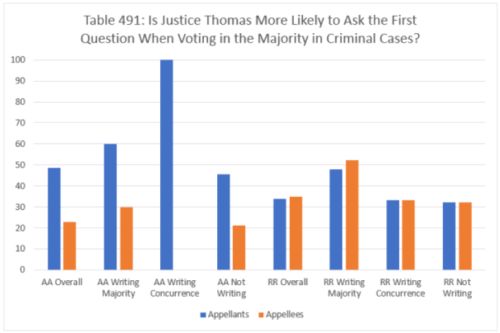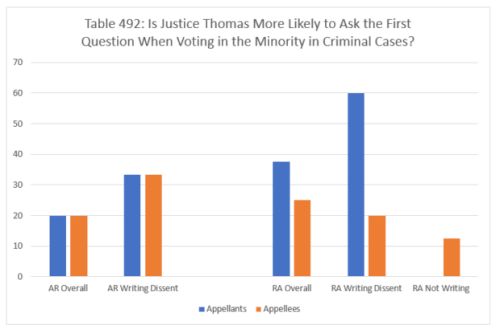Yesterday, we analyzed whether it's possible to infer Justice Thomas' vote and whether or not he's writing an opinion based upon the pattern of his questions in criminal cases. Today, we look at whether it's more likely that Justice Thomas will ask the first question in criminal cases, based upon his vote and whether he's writing.
When voting in the majority of an affirmance, there's a 48.7% chance that Justice Thomas will ask the first question of appellant, and a 22.73% chance that he'll ask the first question of the appellee. Writing the majority opinion has an impact – when writing the majority, there's a 60% chance he'll ask the first question of appellants and a 30% chance that he'll ask the first question of appellees. When not writing in an affirmance, there's a 45.53% chance that Justice Thomas will ask the first question of appellants and a 21.13% chance that he will lead off against appellees.
When voting in the majority of a reversal, there's a 33.73% chance that Justice Thomas will ask the first question of appellants and a 34.94% chance that he'll lead off against the appellees. When writing the majority opinion, there's a 47.83% chance that he'll lead off with the appellants, and a 52.17% chance that he'll ask the first question of appellees. When not writing an opinion, there's a 32.12% chance that Justice Thomas will ask the first question, both of the appellant and the appellee.

When voting in the minority of an affirmance, there's a 20% chance that Justice Thomas will ask the first question of the appellants or the appellees. When writing a dissent in such cases, there's a 33.33% chance that Justice Thomas will ask the first question of appellants or appellees. When voting in the minority of a reversal, there's a 37.5% chance that Justice Thomas will ask the first question of appellants and a 25% chance that he'll ask the first question of appellees. When writing a dissent in such cases, there's a 60% chance that Justice Thomas will ask the first question of appellants and a 20% chance that he'll lead off against appellees.

Join us back here next Tuesday as we begin our look at Chief Justice Karmeier's record in civil cases.
The content of this article is intended to provide a general guide to the subject matter. Specialist advice should be sought about your specific circumstances.


